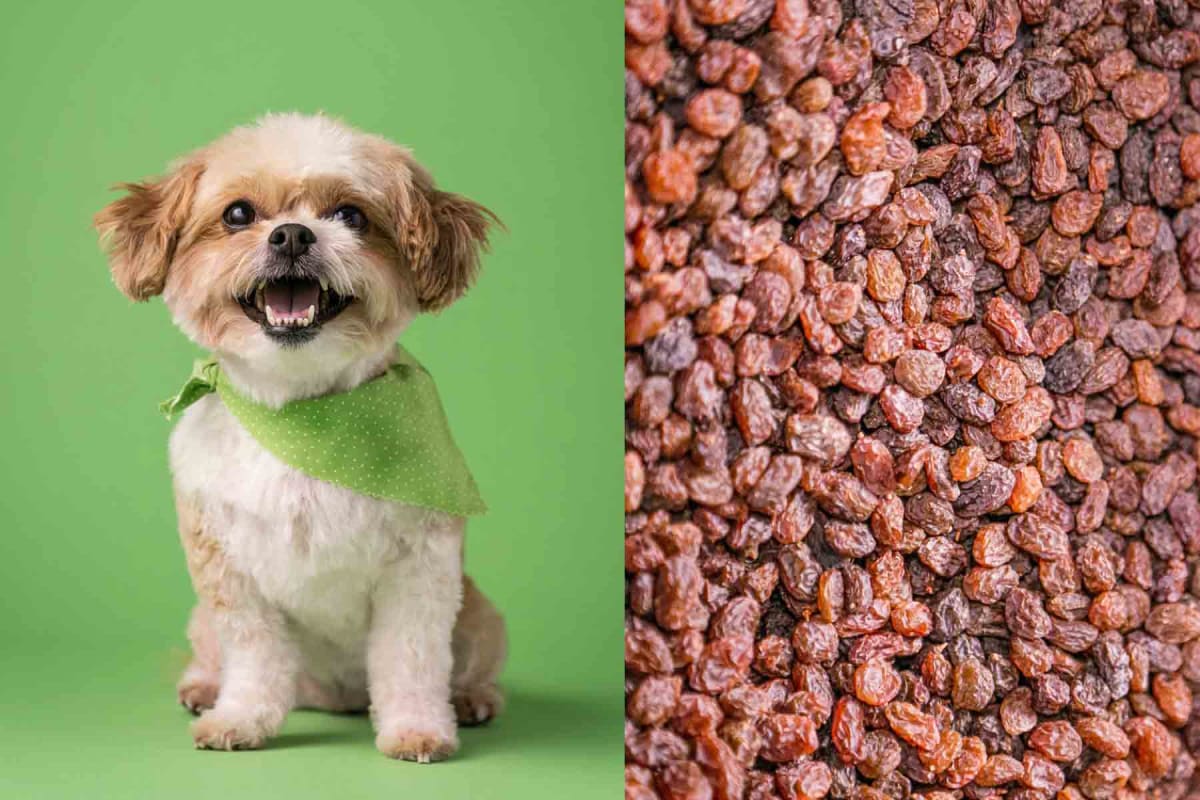
Can dogs eat raisins?
Can dogs eat raisins?
Can dogs have raisins?
If you've ever wondered whether it's safe to share raisins with your furry friend, the short answer is a resounding no. Dogs should never eat raisins under any circumstances. Raisins might seem like a harmless snack to us, but for dogs, they can be extremely dangerous and potentially fatal.
Let's explore why raisins are toxic to dogs and what you should do if your dog consumes them.
Why are raisins bad for dogs?
Scientists still haven't identified the exact substance in raisins that causes toxicity in dogs. Recent research suggests it could be caused by the presence of tartaric acid in the fruit (raisins contain varying concentrations based on their ripeness and maturity), but there is no confirmed scientific consensus.
What we do know is that these fruits can cause acute kidney injury (AKI) in dogs. The toxic reaction affects the kidneys directly, causing them to stop functioning properly and leading to a buildup of toxins in the bloodstream.
Are raisins poisonous to dogs?
Yes, raisins are considered poisonous or toxic to dogs. Unlike some foods that merely cause digestive upset, raisins can cause severe, life-threatening reactions. The poisoning affects the kidneys and can lead to acute kidney failure, which can be fatal if not treated promptly.
How many raisins are toxic to dogs?
What makes raisin toxicity particularly concerning is that the toxic dose varies significantly between individual dogs. While some dogs remain asymptomatic after consuming a pound of raisins, others may die from ingesting just a few. Due to this unpredictability, veterinarians consider any amount of raisin consumption to be an emergency.
What about grapes?
Just like raisins, grapes are toxic to dogs. Whether they're red, green, seedless, or with seeds, all types of grapes pose a serious health risk to dogs. Since raisins are dried grapes, they contain the same toxic compounds but in a more concentrated form.
Signs of raisin toxicity in dogs
If your dog has eaten raisins, watch for these symptoms, which typically develop within 24 hours after ingestion:
Vomiting
Diarrhea
Loss of appetite
Lethargy or weakness
Abdominal pain
Increased thirst and urination initially, followed by decreased or no urination
Dehydration (signs include panting, dry nose and mouth, and pale gums)
Bad breath with an ammonia odor
Tremors or seizures (in severe cases)
The initial signs typically include vomiting and gastrointestinal upset, followed by the development of other symptoms as kidney function becomes compromised. Some dogs may also display neurological symptoms. Remember that by the time symptoms appear, kidney damage may already be occurring.
What to do if your dog eats raisins
If you know or suspect your dog has eaten raisins, treat it as an emergency:
Don't wait for symptoms to appear. Contact your veterinarian, animal poison control center, or an emergency animal hospital immediately.
If possible, note approximately how many raisins were consumed and when.
If it has only been a few minutes since ingestion and you cannot get to a veterinarian right away, your vet may instruct you to induce vomiting at home. However, never do this without professional guidance.
Even if your dog seems fine, proceed with veterinary care. Kidney damage can occur before obvious symptoms develop.
Time is critical in raisin toxicity cases. The sooner treatment begins, the better the chances of preventing serious kidney damage. When in doubt, seek immediate professional help following any grape, raisin, or currant ingestion.
How do veterinarians treat raisin toxicity?
Veterinary treatment for raisin toxicity may include:
Inducing vomiting (if the ingestion was recent)
Administering activated charcoal to absorb toxins
Intravenous fluid therapy to support kidney function and promote toxin elimination
Blood tests to monitor kidney values, calcium, and phosphorus levels
Medications to control vomiting and protect the stomach
Hospitalization for continued monitoring and supportive care
In severe cases, dialysis or other renal replacement therapy
Treatment usually continues for 48 to 72 hours or longer, depending on the severity of the case. The prognosis varies from case to case but is often unfavorable when accompanied by signs such as decreased urine production or no urine production. With prompt and appropriate treatment before symptoms develop, many dogs can recover completely.
How to prevent raisin poisoning in dogs
Prevention is always better than treatment. Follow these guidelines to keep your dog safe:
Store raisins, grapes, and foods containing them (like cookies, cereals, and trail mix) where your dog can't access them.
Inform all family members, especially children, about the dangers of feeding raisins to dogs.
Be careful with unattended plates, especially at gatherings where food might be left within a dog's reach.
Check ingredient lists of baked goods and other foods before sharing with your pet.
Consider using a basket muzzle during walks to prevent your dog from scavenging potentially harmful foods.
Other toxic fruits
While we're discussing raisins, it's worth mentioning there are many other ingredients and foods toxic to dogs, including:
Alcohol
Chocolate
Bread dough/yeast
Garlic, onions, chives, and leeks
Certain mushrooms
Macadamia nuts
Xylitol (artificial sweetener)
Remember, many human foods that seem harmless can be dangerous for our canine friends. Always research before sharing your snacks with your dog. When in doubt about any food and its safety for your dog, always consult with your veterinarian first.